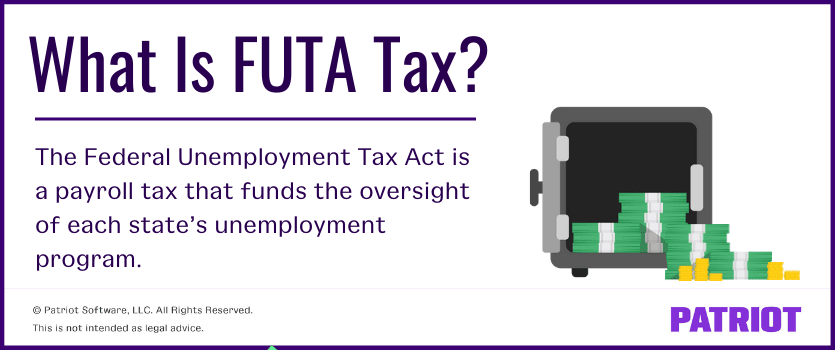The tax world is overflowing with funky-sounding acronyms, and FUTA might be the strangest one out there. You may be wondering, What is FUTA tax? The Federal Unemployment Tax Act (FUTA, for short) is a federal law imposing an unemployment tax on employers. If you’re an employer, you have to know about FUTA tax—because you’ve got to pay it.
Read on to learn more about federal unemployment tax, the rate, and how to report and deposit the tax.

What is FUTA tax?
So, what does FUTA mean? The Federal Unemployment Tax Act is a federal law imposing an unemployment tax on employers. FUTA taxes fund the federal government’s oversight of each state’s unemployment program. President Franklin D. Roosevelt helped bring federal unemployment tax to life back in 1934 because he thought Americans deserved “some safeguard against misfortunes” (e.g., the Great Depression). The Great Depression is long over, but FUTA tax lives on.
Technically, FUTA is a payroll tax. But unlike FICA tax, only employers pay FUTA.
Not all employers qualify for FUTA tax. Three tests help determine if you must pay a FUTA tax on employee wages: a general test, a household employers test, and an agricultural employers test. For this article, we’ll focus on the general test.
According to the general test, you must pay FUTA tax on employee wages if:
- You paid wages of $1,500 or more to employees in any calendar quarter during the current or previous year, OR
- You had one or more employees for at least some part of a day in any 20 or more different weeks in the current or previous year.
Make sure to count all full-time, part-time, and temporary employees.
For more information on the household employers test and the agricultural employers test, see IRS Publication 15.
State unemployment tax programs
Each state has its own unemployment tax to fund unemployment benefits. State unemployment taxes go by many names, depending on the state. Terms for state unemployment taxes include SUTA tax, state unemployment insurance, and reemployment tax.
When a state does not have enough money to pay for unemployment benefits, the state can borrow money from the federal government. The money the federal government lends comes from FUTA taxes.
How much is the FUTA rate?
The FUTA rate is 6% and only applies to the first $7,000 in wages paid to each employee for the year. This $7,000 is also called the FUTA wage base.
The largest FUTA tax amount you’ll pay per employee is $420 ($7,000 X 0.06). You should go back over your numbers if you pay more than $420.
FUTA tax credit
If you pay wages subject to state unemployment tax, you may be eligible for a FUTA tax credit. The FUTA tax credit can cover up to 5.4% of your FUTA taxable wages when you file Form 940, Employer’s Annual Federal Unemployment (FUTA) Tax Return.
The largest possible FUTA tax credit is 5.4%. Employers with the maximum credit only owe 0.6% (6% – 5.4%) on the first $7,000 of each employee’s wages per year. If you qualify for the maximum tax credit, the most you will pay per employee is $42 ($7,000 x 0.006).
Who’s entitled to the maximum credit? You’re entitled to the FUTA tax credit if you paid your state unemployment taxes in full, on time, and your state isn’t a credit reduction state.
Credit reduction state
Some states don’t have enough money to cover their unemployment benefits. When this happens, the state borrows money from the federal government. States have two years to pay back their loan. If they have an outstanding balance on November 10 of the second year, the state becomes a credit reduction state until the loan is repaid.
So, what happens if you’re in a credit reduction state? If you’re in a credit reduction state, the FUTA credit rate for employers is reduced until the state repays the loan. The reduction schedule is 0.3% for the first year and an additional 0.3% for each year the state hasn’t repaid its loan. This means you’ll pay a higher FUTA tax rate in the meantime.
Let’s look at an example of how this works. If you lived in a state with a credit reduction of 0.3%, subtract your state’s credit reduction from your FUTA credit rate. So, if you qualified for the maximum credit of 5.4%, you’d subtract 0.3% from 5.4% (5.4% – 0.3%) for your reduced FUTA credit rate of 5.1%. Then you’d subtract your reduced FUTA credit of 5.1% from the FUTA tax rate of 6% (5.1% – 6%) to find your effective FUTA tax rate of 0.9% for the year.
In this case, 0.9% would be your FUTA rate for the first year. Remember to add 0.3% each year to your state’s credit reduction rate until your state pays off its loan.
The Department of Labor determines credit reduction states. See the Department of Labor’s website for updates.
Depositing and reporting FUTA tax
If you have federal unemployment tax liabilities, you need to make your deposits on time and file Form 940.
FUTA tax deposits
Your FUTA tax depositing schedule depends on your FUTA tax liability. Some employers must deposit quarterly while others (e.g. most small businesses) deposit annually. Here’s the breakdown.
If your FUTA tax liability is less than $500 for a quarter, you must carry it forward to the next quarter. The process continues until your cumulative FUTA tax liability exceeds $500. When this happens, deposit your FUTA tax for that quarter. If you reach the fourth quarter and still have a FUTA tax liability under $500, you can make an EFT deposit, pay the taxes with a credit card, or pay with your Form 940 by January 31.
If your FUTA tax is more than $500 for a quarter, you must make quarterly deposits. You have a month after the end of the quarter to deposit FUTA taxes. For example, the year’s first quarter ends on March 31. If you’re paying FUTA tax for the first quarter, deposit your taxes by April 30.
| Quarter | Quarter End Date | FUTA Tax Due Date |
|---|---|---|
| 1st Quarter (January, February, March) | March 31 | April 30 |
| 2nd Quarter (April, May, June) | June 30 | July 31 |
| 3rd Quarter (July, August, September) | September 30 | October 31 |
| 4th Quarter (October, November, December) | December 31 | January 31 |
If the due date falls on a weekend or legal holiday, make your deposit on the next business day.
FUTA tax reporting
Use Form 940 to report your FUTA taxes.
Form 940 is an annual form that covers all of your employees. File it by January 31 each year for the previous calendar year. For example, if you owed FUTA tax in one year, you must file Form 940 by January 31 of the following year.
If you made all your quarterly deposits on time, complete Form 940 by February 10.
Want employment taxes to be easier than ever? Patriot’s Full Service payroll will make calculating and filing taxes a breeze. Just enter your payroll information, and we’ll handle calculations, deposits, and all the necessary forms. Sign up for a free trial now!
This article is updated from its original publication date of October 12, 2015.
This is not intended as legal advice; for more information, please click here.


